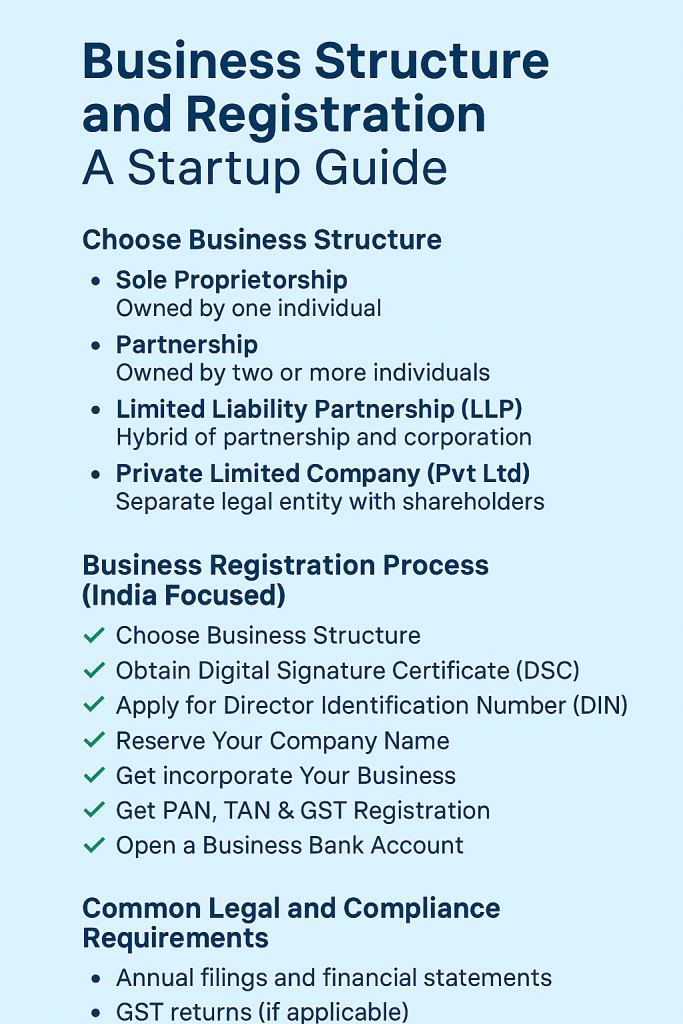Introduction
Starting your entrepreneurial journey? Choosing the right business structure and completing your business registration are two of the most critical early steps. Whether you’re launching a sole proprietorship, partnership, or a private limited company, understanding the types of business entities and the legal requirements for a startup is essential. In this guide, we’ll walk you through how to start a business, register it properly, and stay compliant from day one.
Why Business Structure Matters
Your chosen business structure affects:
-
Legal liability
-
Taxation
-
Fundraising capabilities
-
Operational control
-
Regulatory compliance
For instance, a sole proprietorship is easy to form but offers no personal liability protection, whereas a private limited company limits liability but has stricter compliance requirements.
🔗 Related: Startup Compliance Checklist
Types of Business Entities
Here are the most common types of business structures:
1. Sole Proprietorship
-
Easiest and cheapest to start
-
Owned and run by one person
-
No legal distinction between owner and business
-
Ideal for freelancers or low-risk businesses
2. Partnership
-
Owned by two or more people
-
Shared profits and responsibilities
-
Can be general or limited liability partnerships
-
Requires a partnership deed
3. Limited Liability Partnership (LLP)
-
Hybrid of partnership and corporation
-
Offers limited liability protection
-
Requires registration with the Ministry of Corporate Affairs (MCA)
4. Private Limited Company (Pvt Ltd)
-
Most popular for startups seeking investors
-
Separate legal entity with shareholders
-
Requires at least 2 directors and shareholders
-
High compliance and documentation needs
5. One Person Company (OPC)
-
Suitable for solo entrepreneurs who want limited liability
-
Legally recognized under the Companies Act
-
Requires one director and one nominee
🔗 Related: How to Register a Business in India
How to Choose the Right Structure
Ask yourself:
-
Do you need external funding?
-
What is your risk tolerance?
-
How many founders are involved?
-
Will you scale quickly?
If you’re aiming for startup scalability and funding, a private limited company is usually best. For smaller, bootstrapped ventures, a sole proprietorship or LLP might be more suitable.
🔗 Related: From Idea to Unicorn: Mastering Startup Scalability
Business Registration Process (India Focused)
✅ 1. Choose Business Structure
Decide which entity type suits your vision and risk appetite.
✅ 2. Obtain Digital Signature Certificate (DSC)
Required for filing electronic forms with MCA.
✅ 3. Apply for Director Identification Number (DIN)
Mandatory for anyone planning to be a director.
✅ 4. Reserve Your Company Name
Use the RUN (Reserve Unique Name) service on MCA.
✅ 5. Incorporate Your Business
File the SPICe+ form along with the MOA, AOA, and necessary declarations.
✅ 6. Get PAN, TAN & GST Registration
Essential for tax filing and invoicing.
✅ 7. Open a Business Bank Account
Keep personal and business finances separate.
Common Legal and Compliance Requirements
-
Annual filings and financial statements
-
GST returns (if applicable)
-
Employee State Insurance (ESI) and Provident Fund (PF)
-
Trademark and IP registration
-
Shop and Establishment Act License
Neglecting these can result in fines or even business suspension.
🔗 Related: Cybersecurity Challenges and Solutions for Startups

